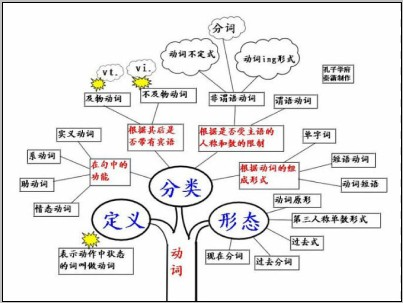本试题 “The pull of gravity depends upon size, _______, upon mass. An object, whether its mass is big or small on the earth, ________in weightless conditio...” 主要考查您对动词
插入语
等考点的理解。关于这些考点您可以点击下面的选项卡查看详细档案。
- 动词
- 插入语
动词的定义:
表示动作中状态的词叫做动词。根据其在句中的功能,动词可分为行为动词、系动词、助动词和情态动词四类,有些动词是兼类词。
例如:We have lunch at 12. (have是行为动词)
We have been to NewYork. (have是助动词)
I am hungry. (am是系动词)
You need not have waited for me. (need是情态动词)
The door needs painting. (need是兼类词)
动词的分类:
1)表示动作中状态的词叫做动词。
2)根据其在句中的功能,动词可分为四类,分别是:
实义动词(Notional Verb)、系动词(Link Verb)、助动词(Auxiliary Verb)、情态动词(Modal Verb)。
说明:有些情况下,有些动词是兼类词。
例如:We are having a meeting. 我们正在开会。(having是实义动词。)
He has gone to NewYork.他已去纽约。(has是助动词。)
3)动词根据其后是否带有宾语,可分为两类,分别是:
及物动词(Transitive Verb)、不及物动词(Intransitive Verb),缩写形式分别为vt.和vi.。
说明:同一动词有时可用作及物动词,有时可用作不及物动词。
例如:She can dance and sing. 她能唱歌又能跳舞。(sing在此用作不及物动词。)
She can sing many English songs. 她能唱好多首英文歌曲。(sing用作及物动词。)
4)根据是否受主语的人称和数的限制,可分两类,分别是:
限定动词(Finite Verb)、非限定动词(Non-finite Verb)。
例如:She sings very well. 她唱得很好。(sing受主语she的限制,故用第三人称单数形式sings。)
She wants to learn English well. 她想学好英语。(to learn不受主语she的限制,没有词形变化,是非限定动词。
说明:英语中共有三种非限定动词,分别是:动词不定式(Infinitive)、动名词(Gerund)、分词(Participle)。
5)根据动词的组成形式,可分为三类,分别是:
单字词(One-Word Verb)、短语动词(Phrasal Verb)、动词短语(Verbal Phrase)
例如:The English language contains many phrasal verbs and verbal phrases. 英语里有许多短语动词和动词短语。(contains是单字动词。)
Students should learn to look up new words in dictionaries. 学生们学会查字典。(look up是短语动词。)
The young ought to take care of the old. 年轻人应照料老人。(takecareof是动词短语。)
6)动词有五种形态,分别是:
原形(OriginalForm)、第三人称单数形式(Singular From in Third Personal)、过去式(Past Form)、过去分词(Past Participle)、现在分词(Present Participle)。
动词知识体系:

插入语的概念:
所谓插入语,就是指插在句子中间,对句子起补充或附加的说明的成分。一般说来,插入语与句中其他部分没有语法上的联系,若将其去掉,句子结构仍然完整。插入语在句中主要起解释、说明、总结等作用,此外还可用于表示说话者的态度和看法、起强调作用、引起别方的注意、转移话题、承上启下等。
插入语的几种类型:
一、形容词(短语)作插入语
如:Sure enough, she was there. 果然她在那里。
Strange to say, he is still ignorant of it.说也奇怪,他还不知道这件事。
Mostimportantofall,theseactivitieshavestrengthenedtheirtieswiththeworkingpeople.最重要的是,这些活动加强了他们和劳动人民的联系。
二、副词(短语)作插入语
如:I'm seeing him in May一or rather early June. 我5月份见他——更确切地说是在6月初。
We must be back be foremidnight;otherwisewe’llbelockedout.我们必须在午夜之前赶回去,否则我们就会被锁在门外。
三、介词短语作插入语
Hedoesn’tmind.Infact,heisverypleased.他不介意,实际上他很高兴。
Bytheway,doyouknowwhereMarylives?顺便问一下,你知道玛丽住在哪里吗?
Theboyisnotfoolish.Onthecontrary,Ithinkheisveryclever.这孩子不愚蠢,相反我认为他很聪明。
Alotofuswanttoleavenow—Bill,forexample[=forexample,Bill].我们很多人现在都想走——比如,比尔就是一例。
四、v-ing分词(短语)作插入语
Generallyspeakingchildrenliketowatchtelevision.一般说来,小孩子喜欢看电视。
Judgingfrom[by]hisaccent,hemaybefromthesouth.听他的口音,他可能是南方人。
五、不定式短语作插入语
Tobeginwith,Idonotlikeitscolour.首先,我不喜欢它的颜色。
Totellthetruth,thefilmwasagreatdisappointmenttome.说实在的,那部影片使我大为失望。
Tomakealongstoryshort,weagreedtodisagree.长话短说,我们同意各自保留不同的看法。
六、句子(陈述句和一般疑问句等)作插入语
Believeitornot,theygotmarriedsoon.信不信由你,他们不久就结婚了。
Helearnseasily,andwhat’smore,herememberswhathehaslearnt.他学习起来很容易,而且他所学习过的都记得住。
Hedidn’tgo,that’stosay,it’snotrecordedthathedid.他没去,换句话说,他去了这个事实无案可查。
插入语用法例题解析:
插入语是一种独立成分,通常与句中其他成分没有语法上的关系,插入语大都是对一句话进行附加说明或解释,通常由一个词、一个短语或一个句子构成,常置于句首、句中或句末,一般用逗号或破折号与句子隔开。下面举例归纳插入语的几种用法。
例1:____the more expensive the camera, the better its quality.
A. General speaking
B. Speaking general
C. Generally speaking
D. Speaking generally
解析:本题答案为C. generally speaking为分词短语,意思是“一般来说”,在句中用作插入语。
小结:许多分词短语可以用作插入语,这样的分词短语有:strictly speaking(严格地说),generally considering(一般认为),judging from……(根据……判断)等。
例2:Two middle-aged passengers fellin to the sea.____, neither of them could swim.
A. In fact
B. Luckily
C. Unfortunately
D. Naturally
解析:本题答案为C. unfortunately为副词,意思是“令人遗憾地,不巧,可惜”,在句中用作插入语。
小结:常用作插入语的副词或副词短语有:indeed(的确),surely(无疑),however(然而),frankly(坦率地说),obviously(显然),naturally(天然地),luckily(happily)forsb.(算某人幸运),fortunately(幸好),strangely(奇怪),briefly(简单地说)等。
例3:Your performance in the driving test didn't reach the required standard, ____, you failed.
A. in the end
B. after all
C. in other words
D. at the same time
解析:本题答案为C. in other words为介词短语,意思是“换句话说”,在句中用作插入语。
小结:常用作插入语的介词短语有:in conclusion(总之),in a word(简而言之),in short(简而言之),in general(一般说来),in a sense(在某种意义上),in my view(在我看来),in his opinion(按照他的看法),in fact(事实上),at first(首先),in addition(此外),of course(当然),to my surprise(使我惊奇的),to her regret(使她遗憾的),for example(例如)等。
例4:It is so nice to hear from her.____, we last met more than thirty years ago.
A.What's more
B. That is to say
C. In other words
D. Believe it or not
解析:本题答案为D. believe it or not为一分句,意思是“信不信由你”,在句中作插入语。
小结:用简短的句子结构作插入语,它们常置于句中或句末。这类简短的句子有:I am sure(我可以肯定地说),I believe(我相信),do you know(你知道吗),you see(你明白),I'm afraid(恐怕),it is said(据说),I suppose(我想),what's more(而且),what's worse(更糟糕的是),that is(也就是说),what is important(重要的是)等。
例5:____with you, I have no money to spare.
A. To be frank
B. What's more
C. In addition
D. However
解析:本题答案为A. to be frank为不定式短语,意思是“坦率地说”,在句中用作插入语。
小结:常用作插入语的不定式短语有:to be sure(无疑地),to sumup(概括地说),to tell the truth(老实说)等。
例6_____, he should have done such a thing.
A. Speakinggeneral
B. Strangetosay
C. Luckily
D. Ofcourse
解析:本题答案为B. strange to say为形容词短语,意思是“说也奇怪”,在句中用作插入语。
小结:常用作插入语的形容词或其短语有:true(真的),funny(真可笑),needless to say(不用说),mos timportant of all(最为重要),worse still(更糟糕的),even better(更好)等。
插入语的几种类型:
1)形容词(短语)作插入语:
能用作插入语的形容词(短语)常见的有:true,wonderful,excellent,strangetosay, mostimportantofall,sureenough等。
如:True, it would be too bad. 真的,太糟了。
Wonderful, we have won again. 太好了,我们又赢了。
2)副词(短语)作插入语:
能用作插入语的副词(短语)有:indeed,surely,still,otherwise,certainly,however, generally,personally,honestly,fortunately,luckily,though,besides,exactly, perhaps,maybe,probably,frankly,orrather等。
如:When he got there, he found, however, that the weather was too bad. 可是到了那儿之后他发现,那儿的天气太坏了。
Otherwise, he would still be at home. 不然的话,他还会在家的。
3)介词短语作插入语:
能用作插入语的介词短语有:in fact,in one's opinion,in general,in a word,in other words,in a few words,of course,by the way,as a result,for example,on the contrary,on the other hand,to one's surprise,in short,as a matter of fact, in conclusion,in brief等。
如:You can't wait any more-in other words, you should start at once. 你不能再等了—换言之,你得立即出发。
On the contrary, we should streng then our cooperation with them. 相反,我们应该加强和他们的合作。
4)V-ing(短语)作插入语:
能用作插入语的V-ing(短语)常见的有:generally speaking,strictly speaking,judging from by,talking of,considering等。
如:Generally speaking, the weather there is neither too cold in winter nor too hot in summer. 一般来说,那儿的气候冬天不太冷,夏天不太热。
Judging by his clothes, he may be an artist. 从衣着来判断,他可能是个艺术家。
5)不定式短语作插入语:
能用作插入语的不定式短语有:to be frank,to be honest,to be sure,to tell you the truth,to make matters worse,to sumup,to start with,to begin with等。
如:To be frank, I don't quite agree with you. 坦率地说,我不太同意你的意见。
To tell you the truth, I'm not so interested in the matter. 跟你说实话,我对这件事情的兴趣不大。
To sumup, success results from hard work. 总而言之,成功是艰苦努力的结果。
6)句子(陈述句和一般疑问句)作插入语:
能用作插入语的句子有:I am sure,I believe,I think,I know,I suppose,I hope,I'm afraid,you see,what's more,that is to say,as we know,as I see,believe it or not等。
如:Some animals only half-hibernate, that is to say, their sleep is not such a deep one. 有些动物只是半冬眠,就是说,它们的睡眠并不是深度睡眠。
I believe, China will catch up with the developed countries sooner or later. 我确信,中国迟早会赶上发达国家。
He can't pass the exam, because he doesn't study hard.
What's more, he isn't so clever. 他不能通过这次考试,因为他学习不认真,更何况他又不太聪明。
与“The pull of gravity depends upon size, _______, upon mass...”考查相似的试题有:
- In all kinds of competitions, Jackie ________ a most excellent athlete. He has won so many gold medals.A.practisesB...
- How did it______ that humans speak so many different languages?A.come outB.come offC.come aboutD.come round
- Internet shopping will really _____ when people believe that it is safe.A.take offB.take upC.get offD.get up
- The participants were encouraged to _______ others in the class to do the project, and the entire team would get cred...
- The Russian Railway has _______ the prices of tickets for long-distance trains.A.cut downB.broken downC.turned dow...
- As the popular saying ______, “Laugh and the whole world laugh with you. Cry and you cry alone.”A.speaksB.goesC.te...
- Don’t believe in him; he was _____ with the ability to tell lies.A.fixedB.equippedC.suppliedD.born
- They’ve ________ us $ 150,000 for the house. Shall we take it?[ ]A. providedB. suppliedC. shownD. offered
- ---Did you reach the top of the mountain?---Yes.Even I myself didn’t believe I could ______ it.A.workB.climbC.ma...
- Would you please ___ our drive around the city?A.joinB.join inC.take active part inD.take in